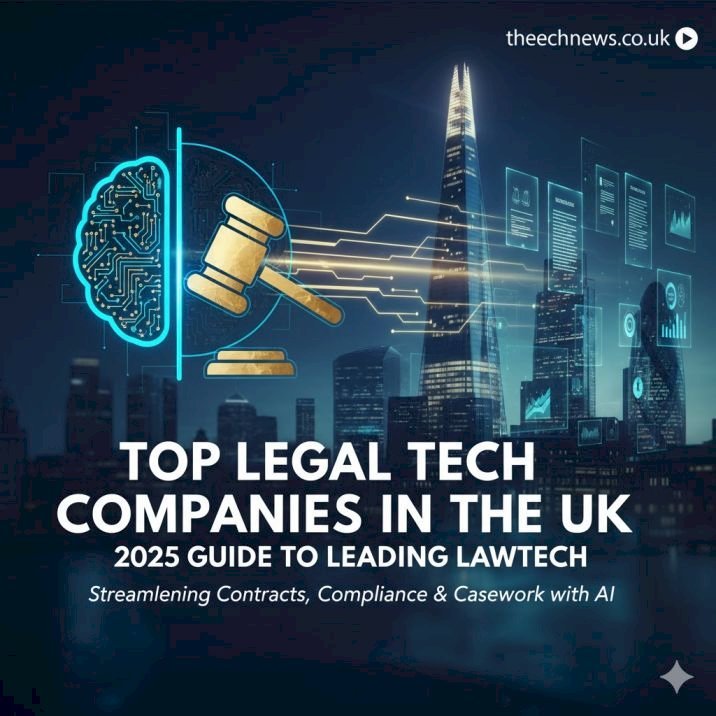Top Legal Tech Companies in the UK (2025 Guide to Leading Lawtech)
Discover the top legal tech companies in the UK. Explore leading AI and workflow solutions transforming legal services, compliance, contract review, and in-house operations.

Legal tech companies in the UK develop software and AI-driven tools that streamline contract drafting, document review, compliance checks, and workflow management. The UK is a global leader in legal tech innovation, with companies such as Luminance, Lawhive, Robin AI, Legl, Genie AI, Clausematch, Thirdfort, and others helping legal teams improve efficiency, reduce manual workloads, and transform how legal services are delivered.
The UK remains a global leader in legal services, but how legal work is delivered is changing dramatically. Rising regulatory demands, expectations for transparency, and the need to operate faster have pushed legal teams to modernise. Legal technology has evolved from basic document automation into advanced platforms supporting drafting, review, compliance oversight, onboarding, and workflow management. Analysts estimate the legal tech market at $26–30 billion in 2024, with projections showing it could surpass $50–60 billion over the next decade. The UK is central to this growth due to its concentration of global law firms, regulated industries, and legal expertise.
What Is Legal Tech?

Image source: pexels.com
Legal technology refers to digital platforms and AI-supported systems designed to improve the accuracy, consistency, and efficiency of legal work. These systems support legal professionals by reducing manual work in drafting, review, matter tracking, policy governance, and contract negotiation. Unlike general productivity software, legal tech is built specifically around legal language structures, risk considerations, and compliance obligations.
Legal tech does not replace lawyers. It strengthens their decision-making by organising information, automating repetitive processes, accelerating document analysis, and maintaining auditability. In-house legal teams, law firms, regulatory teams, and corporate governance functions rely on these systems to operate at the pace of business demands.
Why the UK Is a Global Hub for Legal Tech

Image source: pexels.com
The UK’s legal landscape presents unique conditions that encourage adoption of technology-enabled legal work:
-
The UK legal system underpins commercial law standards used globally.
-
London is a financial and regulatory capital, where legal teams manage complex, multi-jurisdictional risk.
-
Corporate legal departments are increasingly expected to absorb more work internally while maintaining fixed budgets.
-
Law firms face pressure to demonstrate efficiency and offer pricing clarity.
-
The rise of AI has created feasible pathways to accelerate document-heavy workflows.
In this environment, legal tech is not just beneficial; it is strategically necessary.
Why Generic, One-Size-Fits-All Tools Often Fail

Image source: pexels.com
Legal work is rarely linear. It involves negotiation cycles, conditional approvals, clause interpretation, and organisation-specific regulatory requirements. Generic workflow tools often fail because they assume uniform, predictable processes—something legal teams do not have.
Common failure points include:
-
Limited support for legal review and escalation paths
-
Weak integration with document repositories or CRM systems
-
Inflexible templates, playbooks, or workflow configurations
-
Lack of training and change management during adoption
Effective legal tech implementation must begin with clearly defining the operational problem. Successful solutions are intentionally designed around real legal workflows rather than forcing teams to adapt to generic software.
Top 10 Legal Tech Companies in the UK (2025)

Image source: pexels.com
10. Thirdfort (Islington)
Thirdfort provides secure digital identity verification and anti-money-laundering checks used by law firms, property firms, and professional service providers. Its platform reduces onboarding friction while protecting organisations from fraud risk. Thirdfort expanded its capability set by acquiring tenant risk assessment technology, further strengthening its role in property-linked legal compliance.
9. Avantia Law (Southwark)
Avantia Law combines regulated legal services with built-in workflow automation. It is designed for organisations that require structured contract processes, standardised compliance activities, and repeatable advisory support. The firm demonstrates how service delivery and technology can be integrated to produce scalable legal outcomes without fragmenting knowledge or methodology.
8. Orbital Witness (Islington)
Orbital Witness supports property due diligence by applying AI to land and transaction documents. These reviews are historically time-consuming and detail-intensive. The platform helps legal teams identify risks earlier, reduce uncertainty, and accelerate property transaction timelines. Its focus reflects the growing need for domain-specific legal AI.
7. Equilaw (Tewkesbury)
Equilaw specialises in equity release legal services. Backed by multi-million-pound investment, the organisation has developed a technology-supported workflow that improves turnaround time and enhances documentation consistency. Equity release requires regulatory clarity and customer assurance, making process reliability critical. Equilaw demonstrates how legal tech can excel in niche legal verticals.
6. Clausematch (Now Part of Corlytics)
Clausematch provides structured policy governance, version control, and compliance documentation management. Following its integration into Corlytics, the combined platform supports organisations subject to ongoing regulatory change. Clausematch ensures that internal policies are traceable, auditable, up-to-date, and aligned with external compliance expectations.
5. Genie AI (Kensington & Chelsea)
Genie AI offers AI-assisted contract drafting and negotiation support. The platform enables legal teams to generate, refine, and standardise legal language using shared knowledge patterns. Genie AI has raised over £13 million to scale its approach to contract knowledge management. It is particularly suited to organisations seeking to build and enforce consistent contracting playbooks.
4. Legl (City of London)
Legl enables law firms to modernise client onboarding, compliance checks, and payment workflows. It replaces fragmented manual onboarding processes with structured verification and risk assessment steps. This strengthens regulatory oversight while improving client experience. Legl’s systems are designed to align with firm-level governance and reduce administrative burden.
3. Robin AI (City of London)
Robin AI offers AI-supported drafting, contract review, clause comparison, and legal search capabilities. It is widely adopted by in-house legal teams handling recurring contract flows where speed and accuracy are essential. Robin AI reflects the shift toward contract automation tools that support negotiation rather than only document storage.
2. Lawhive (Hackney)
Lawhive operates a digital platform that connects legal professionals with clients, focusing on consumer and small-business legal needs. By integrating workflow automation with legal expertise, Lawhive provides efficient, cost-effective legal support. It represents the widening focus of legal tech beyond enterprise environments to accessible legal service delivery.
1. Luminance (Westminster)
Luminance is a leading provider of AI-powered document analysis, contract review, and due diligence technology. Its platform supports law firms and enterprise legal departments managing large, complex document sets. Luminance’s latest fundraising (£60 million, Series C in 2025) strengthened its expansion into advanced legal AI workflows. The company illustrates how legal-grade AI can elevate accuracy, speed, and confidence in high-value legal decision-making.
Conclusion
Legal technology in the UK has entered a period of sustained adoption. The organisations seeing the greatest success are those that implement legal tech intentionally—aligning tools with real workflows, clear outcomes, and long-term operational strategy. The companies shaping today’s market show that legal technology’s role is not to replace lawyers, but to enhance their ability to deliver clarity, speed, precision, and trusted advisory value.
Legal tech is not a passing trend. It has become the new operational foundation for the modern legal profession.
FAQs
1. What does a legal tech company do?
Legal tech companies develop software and AI tools that support legal work, such as contract drafting, document review, compliance checks, client onboarding, and workflow management. Their goal is to make legal processes faster, more accurate, and easier to manage.
2. Why is the UK a hub for legal tech?
The UK is home to major law firms, regulated financial institutions, and international corporate headquarters. These organisations face complex legal and compliance demands, which has encouraged early adoption of advanced legal technology.
3. How are AI tools used in legal work?
AI tools assist with summarising documents, identifying clause risks, generating contract language, organising case information, and automating repetitive administrative tasks. They enhance efficiency without replacing lawyer expertise.
4. Which businesses benefit most from legal tech?
In-house legal teams, law firms, property companies, financial services organisations, compliance departments, and regulated industries benefit most, especially where workflows involve large volumes of documents or strict compliance requirements.
5. How do I choose the right legal tech solution?
Begin by identifying your legal team’s highest-friction processes (e.g., contracting delays or onboarding bottlenecks). Choose technology that integrates with your existing systems, supports real workflows, and includes user training and adoption support.
6. Is legal tech replacing lawyers?
No. Legal tech does not replace legal professionals. Instead, it reduces manual work and supports better decision-making, allowing lawyers to focus on advisory, negotiation, and strategic matters.
7. What trends are shaping legal tech in 2025?
Key trends include AI-driven contract workflows, integrated compliance platforms, Microsoft-based solution development, and technology tailored specifically for in-house legal teams rather than general operations.

 AnniWeston
AnniWeston 












